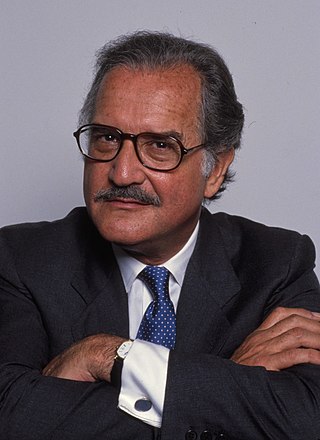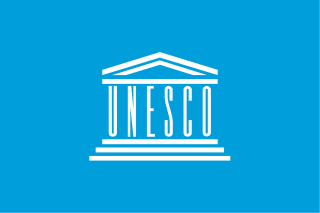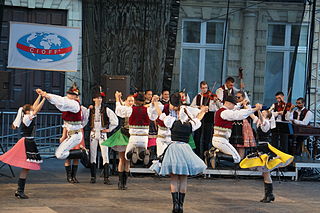
Carlos Fuentes Macías was a Mexican novelist and essayist. Among his works are The Death of Artemio Cruz (1962), Aura (1962), Terra Nostra (1975), The Old Gringo (1985) and Christopher Unborn (1987). In his obituary, The New York Times described Fuentes as "one of the most admired writers in the Spanish-speaking world" and an important influence on the Latin American Boom, the "explosion of Latin American literature in the 1960s and '70s", while The Guardian called him "Mexico's most celebrated novelist". His many literary honors include the Miguel de Cervantes Prize as well as Mexico's highest award, the Belisario Domínguez Medal of Honor (1999). He was often named as a likely candidate for the Nobel Prize in Literature, though he never won.

Carlos Juan Finlay was a Cuban epidemiologist recognized as a pioneer in the research of yellow fever, determining that it was transmitted through mosquitoes Aedes aegypti.

The L'Oréal-UNESCO For Women in Science Awards, created in 1998, aim to improve the position of women in science by recognizing outstanding women researchers who have contributed to scientific progress. The awards are a result of a partnership between the French company L'Oréal and the United Nations Educational, Scientific and Cultural Organization (UNESCO) and carry a grant of $100,000 USD for each laureate. This award is also known as the L'Oréal-UNESCO Women in Science Awards.
Walter Fiers was a Belgian molecular biologist.

Pascale Cossart is a French bacteriologist who is affiliated with the Pasteur Institute of Paris. She is the foremost authority on Listeria monocytogenes, a deadly and common food-borne pathogen responsible for encephalitis, meningitis, bacteremia, gastroenteritis, and other diseases.
Etienne Pays is a Belgian molecular biologist and professor at the Universite Libre de Bruxelles. His research interest is on trypanosomes.
The Robert Koch Medal and Award are two prizes awarded annually by the German Robert Koch Foundation for excellence in the biomedical sciences. These awards grew out of early attempts by German physician Robert Koch to generate funding to support his research into the cause and cure for tuberculosis. Koch discovered the bacteria responsible for the dreaded disease and rapidly acquired international support, including 500,000 gold marks from the Scottish-American philanthropist Andrew Carnegie.

Susana López Charretón is a Mexican virologist specialized in understanding the mechanisms of infection of rotavirus. López Charretón has led a research program as principal investigator at the Biotechnology Institute (UNAM) in Cuernavaca, Mexico for over 25 years.
Carlos Federico Arias Ortiz is a Mexican biochemist specialized in rotaviruses. Along his wife, Susana López Charretón, he has been a co-recipient of both the 2001 Carlos J. Finlay Prize for Microbiology and the 2008 TWAS Prize in Biology.
Carlos Arias may refer to:

The United Nations Educational, Scientific and Cultural Organization (UNESCO) is a specialized agency of the United Nations (UN) with the aim of promoting world peace and security through international cooperation in education, arts, sciences and culture. It has 194 member states and 12 associate members, as well as partners in the non-governmental, intergovernmental and private sector. Headquartered in Paris, France, UNESCO has 53 regional field offices and 199 national commissions.
Antonio Peña Díaz is a Mexican biochemist who received the Carlos J. Finlay Prize for Microbiology and chaired both the Mexican Academy of Sciences (1992–93) and the Mexican Society of Biochemistry (1981–83).
Antonio Peña may refer to:

The International Council of Organizations of Folklore Festivals and Folk Arts is an international nongovernmental organization (NGO) in Official partnership with UNESCO and is accredited to provide advisory service to the Committee of the UNESCO Convention for the Safeguarding of Intangible Cultural Heritage. CIOFF has 63 full members, 21 associate members and 18 corresponding members worldwide and 3 partner members. Its headquarters are in Confolens in France. Full members are National Sections with the aim to preserve traditional art, to organize Folklore Festivals or similar activities as well as unite voluntary organizations, working in the field of dance, music, costumes, customs and ethnography. The National Sections belong to sectors in the organization according to their geographic location.
Ruth Sonntag Nussenzweig was an Austrian-Brazilian immunologist specializing in the development of malaria vaccines. In a career spanning over 60 years, she was primarily affiliated with New York University (NYU). She served as C.V. Starr Professor of Medical and Molecular Parasitology at Langone Medical Center, Research Professor at the NYU Department of Pathology, and finally Professor Emerita of Microbiology and Pathology at the NYU Department of Microbiology.
B. Brett Finlay, is a Canadian microbiologist well known for his contributions to understanding how microbes cause disease in people and developing new tools for fighting infections, as well as the role the microbiota plays in human health and disease. Science.ca describes him as one of the world's foremost experts on the molecular understanding of the ways bacteria infect their hosts. He also led the SARS Accelerated Vaccine Initiative (SAVI) and developed vaccines to SARS and a bovine vaccine to E. coli O157:H7. His current research interests focus on pathogenic E. coli and Salmonella pathogenicity, and the role of the microbiota in infections, asthma, and malnutrition. He is currently the UBC Peter Wall Distinguished Professor and a Professor in the Michael Smith Laboratories, Microbiology and Immunology, and Biochemistry and Molecular Biology, and Co-director and Senior Fellow for the CIFAR Humans and Microbes program. He is also co-author of the book Let Them Eat Dirt: Saving Your Child from an Oversanitized World and The Whole-Body Microbiome: How to Harness Microbes - Inside and Out - For Lifelong Health. Finlay is the author of over 500 publications in peer-reviewed journals and served as editor of several professional publications for many years.

Samir Kumar Saha is an eminent Bangladeshi microbiologist and public health expert. He is the professor, senior consultant and head of the department of Diagnostic Division of Microbiology at the Dhaka Shishu Hospital for children and also the executive director of The Child Health Research Foundation (CHRF) at the Bangladesh Institute of Child Health.
Jean-Marie Ghuysen (1925-2004), was a Belgian academic.
Shahida Hasnain is a professor at the University of the Punjab, specializing in botany and genetics.
Jim Lynch is a distinguished Professor of life sciences at the University of Surrey. He is author of more than 250 publications with over 12,000 citations. In 1993, he was awarded the Carlos J. Finlay Prize for Microbiology.








